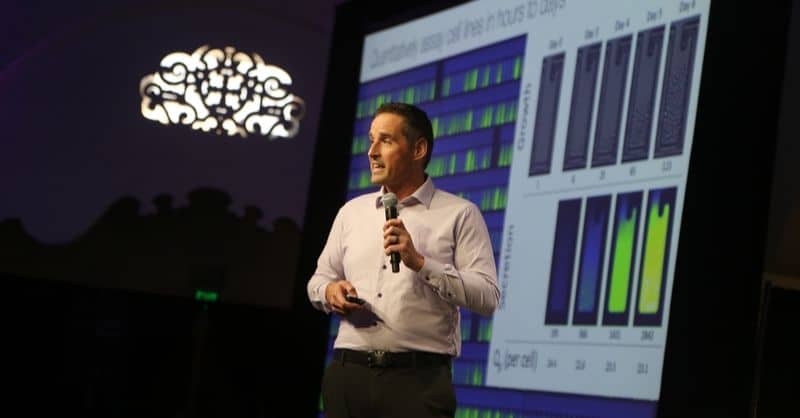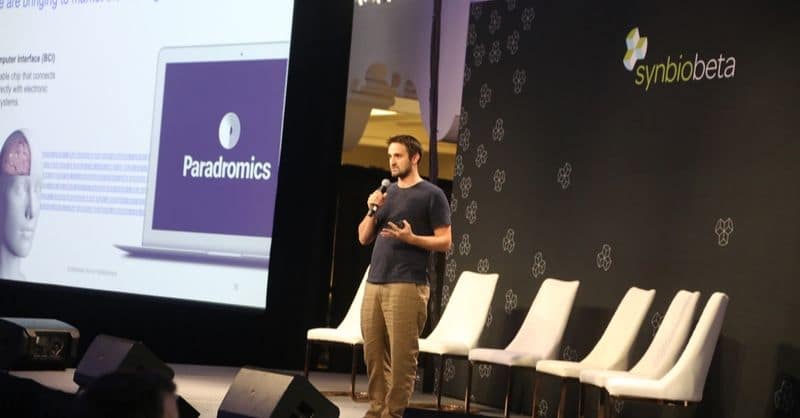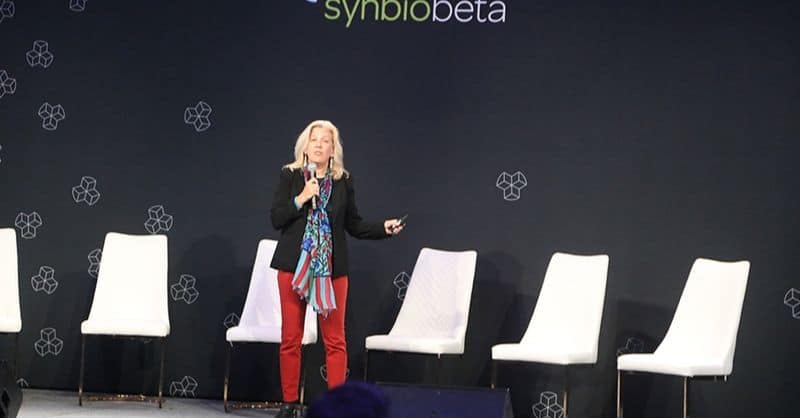-
article · 2026Year9Moon29Day
Flex蛋白质组学工作站的功能与优势
Read More -
article · 2025Year13Moon27Day
Opentrons Flex蛋白质组学工作站:提升实验室效率的秘密武器
Read More -
article · 2025Year42Moon26Day
Flex 工作站在蛋白质组学实验中的最佳实践是什么?
Read More


SynBioBeta 2019 features a lightning talk program highlighting the lightning-fast pace of innovation in synthetic biology. Covering everything from digital noses to plug-and-play robotic labs, the talks offered a glimpse into the future of bioengineering. Stephanie Michelson of SynBioBeta moderated the event. First, Troy Lionberger of Berkeley Lights demonstrated how his company's Beacon optofluidic platform accelerates the live cell screening process, shortening the cell selection process from months to just days. Beacon enables fast and straightforward analysis of cells and clones, assays of cell cultures, and graphic capture of data. The Beacon platform can even track and analyze the same individual cells at multiple time points to reveal richly detailed “fingerprints” of cells and clones.

Troy Lionberger, PhD, Berkeley Lighting. Lionberger announced that Berkeley Lights has entered into a $150 million collaboration with Ginkgo Bioworks to accelerate the development of cell-based products for a broad range of markets beyond biopharma, including flavors and fragrances. Next, Will Wright of the iGEM Foundation highlighted the leading role the annual iGEM competition has played in advancing the field of synthetic biology. Since 2004, iGEM has brought together student teams to use synthetic biology to solve real-world problems. Along the way, these young researchers learn the fundraising, organizational and problem-solving skills needed to turn ideas into viable products. Over the past decade, more than 150 iGEM-based businesses have raised more than $1.8 billion in total funding. Aromyx CEO Josh Silverman explains how his company is digitizing the world of scent. Humans can distinguish more than 1 trillion odors, but our ability to measure and record odors has always been limited because it relies on human testers and subjective observation.
Aromyx solved this problem by cloning 400 different types of human olfactory receptors. It then quantitatively measures their response to sample odors and uses artificial intelligence to create a final map of the landscape. Early applications include food and beverages, pharmaceuticals and plastics. Aromyx is currently raising a Series A round of funding to meet this strong customer demand. Robert McBride, co-founder of seed-stage company Felix Biotechnology, stressed the urgent need for drugs that target antibiotic-resistant bacterial infections. A study commissioned by the UK government predicts that by 2050 more people will die from antibiotic-resistant "superbugs" than from cancer. San Francisco-based Felix Biotechnology, in collaboration with researchers at Yale University and the University of California, Berkeley, is developing tools to accelerate the development and deployment of phage therapies for these infections.

Laura Whitman, global senior product manager at Agilent Technologies, provides an overview of Agilent's broad range of synthetic biology products and services. Agilent reinvests approximately 8% of revenue in research and development and partners with startups, demonstrating its commitment to leading technology. Agilent offers a full range of biological reagents, including DNA and RNA oligonucleotides, sgRNA and CRISPR libraries. Next, Paradromics founder and CEO Matt Angle describes the company's mission to build high-capacity brain-computer interfaces that transform some of today's toughest physical and mental health challenges into data problems. The nickel-sized device, currently in preclinical development, could be implanted into the human brain and connected to specialized digital prosthetics to treat conditions ranging from blindness to schizophrenia. The Paradromics device requires FDA approval, but Angle expects to launch the company's first product in 2025. He noted that key technologies such as sensory and motor prosthetics are already in place.
Matt Angle of AbCellera's ParadromicsMaia Smith explains how the Vancouver-based startup is combining microfluidics, next-generation DNA sequencing and machine learning to accelerate antibody discovery. Antibodies are the fastest-growing class of drugs used to treat indications such as cancer, arthritis, pain and infection. When antibodies bind to pathogens, the immune system drives a rapid evolutionary process of mutation and selection, resulting in highly optimized antibodies. AbCellera's Celium platform can analyze antibody responses more than 10 times faster and more than 100 times deeper than existing methods, while providing detailed information about the sequence and properties of each antibody. The platform helps leading pharmaceutical companies produce large quantities of high-quality antibodies, along with the data needed to predict which antibodies are suitable for development. Next, Kristin Ellis, director of strategic initiatives at Opentrons in Brooklyn, debunks the idea of lab automation. Inherently complex, expensive and dependent on proprietary technology.
The Opentrons OT-2 pipetting robot, for example, costs about $5,000 and uses an open source API for plug-and-play simplicity. Developed in close collaboration with industry-leading "co-developers" including Dr. Geoff Baldwin of Imperial College London, Boston University's DAMP Laboratory, and the BioBricks Foundation, the OT-2 handles repetitive liquid handling tasks with ease. Additionally, Opentrons recently launched the world’s most affordable fully automated thermal cycler, bringing end-to-end PCR-based workflow automation to biologists around the world. Linda Molnar of the National Science Foundation highlights U.S. seed funding to support high-impact, high-risk technology startups. The fund awards 400 grants annually, totaling $200 million, to start-ups and small businesses that NSF hopes will succeed commercially and have a positive impact on society. The fund does not charge any equity, and recipients retain full control of their teams, intellectual property and the direction of their work. U.S. Seed Funds has provided initial funding to a number of high-profile startups, including Ginkgo Bioworks, Lygos, Novome Biotechnologies, and Living Ink Technologies. Dr. Molnar concluded by highlighting the social benefits of the circular economy in a world where the population is expected to reach 8.4 billion by 2030.

Linda Molnar of the National Science Foundation Next, Benchling's Reed Molbak explains how his company's cloud platform accelerates life sciences R&D by integrating all experimental data and workflows into a unified system. Historically, life science data were created and stored in disparate locations, with PhD researchers spending valuable time gathering the information they needed. Since its launch in 2012, Benchling has grown to become the most widely adopted life sciences R&D cloud software, used by more than 170,000 scientists worldwide. These researchers rely on Benchling's suite of cloud applications to design DNA, collaborate on experiments, manage research workflows and make critical R&D decisions. 2019 is shaping up to be another record year for synthetic biology investment. As these Lightning Talks illustrate, the pace of innovation is accelerating as today's technologies become the building blocks of tomorrow's breakthroughs.
The experienced service team and strong production support team provide customers with worry-free order services.

简体中文

繁體中文

English

日本語

한국인